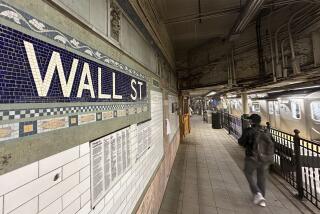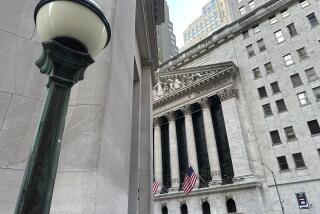FINANCIAL MARKETS : Rate Worries Hurt Stocks for 4th Day
Wall Street stocks fell for the fourth straight session Tuesday, as traders grew pessimistic about rising interest rates and the falling dollar.
The benchmark 30-year U.S. Treasury bond has continued to trade above 8%, raising fears that higher interest rates could lure investors from stocks and also inhibit corporate profits next year.
“There’s just that fear of rates,” said Jack Regan, market analyst at Josephthal, Lyon and Ross.
The Dow Jones average closed down 4.71 points at 3,850.59--bringing to about 85 points the amount the index has lost since it began falling last Thursday.
In the broader market, declining issues outnumbered advancers by about 9 to 5 on the New York Stock Exchange, where a hefty 326.11 million shares changed hands, up from the previous session’s 287.64 million.
The Treasury’s bellwether long-bond yield remained stuck at its 2 1/2-year high of 8.04%. Its price ended down 1/32 point, or 31 cents per $1,000 in face value.
Shorter-term Treasury securities ranged from unchanged to 1/16 point lower, the Telerate Inc. financial information service reported.
“The fact that they’ve broken through (8% on the long bond yield) and held through it just worries people a little more,” said Marshall Acuff, portfolio strategist at Smith Barney.
“Today was a spillover from yesterday. A continually weak bond market is continuing to put pressure on the equity market,” said Acuff.
The falling dollar also added pressure, since it is a sign that foreign investors are leaving U.S.-based assets. The dollar hit a fresh post-World War II low against the Japanese yen and a new two-year low against the German mark.
It closed in New York at 96.83 yen, down from 97.13 late Monday. The dollar also was changing hands in New York at 1.495 German marks, up from 1.494.
Dealers said the dollar is likely to continue downward until a change in fundamentals, such as an increase in U.S. interest rates or a sustained rally in stock and bond prices, attracts buyers.
Stock and bond markets have been weak for several days amid signs that growth in the U.S. economy isn’t slowing down enough to prevent resurgent inflation. Investors are waiting for the Federal Reserve Board to make its next move to raise interest rates, hoping that the central bank can once-and-for-all get a handle on rising prices.
Inflation erodes the value of fixed-income investments like bonds, which pay a fixed interest rate over months or years. The Fed’s chief weapon against inflation--raising rates--can hurt stocks because rising rates make corporate borrowing more expensive and make shares less attractive compared to safer investments like certificates of deposit.
Brett Discher of Dain Bosworth said the dollar, bonds and stocks have been moving in a “chain reaction.” The dollar weakness spills over and depresses bonds, which then have a negative influence on stocks.
Among the market highlights:
Economically sensitive stocks were among the weakest, reflecting concern about growth in the economy if interest rates continue to rise.
Among the 30 stocks that make up the Dow average, Alcoa fell 1 1/8 to 85 1/8 and International Paper gave back 1 5/8 to 75 1/4.
* Mobil surged 3 to 83 1/4 on news the company plans to further restructure its operations. Dean Witter upgraded the stock to strong buy from accumulate.
The interest rate uncertainty pushed down big cyclical stocks, which rise and fall with the economy. Paper companies were down, such as Georgia Pacific, off 2 1/4 to 73; along with chemical companies including Dow Chemical, down 1 5/8 to 73 1/4.
* Mexican telecommunications company Telefonos de Mexico tumbled 3 1/8 to 57 3/8 in heavy trading after reporting disappointing nine-month earnings late Monday.
* Other Mexican stocks sank along with Telmex and the Mexico City Bolsa plummeted 55.24 points to 2,578.38.
More to Read
Inside the business of entertainment
The Wide Shot brings you news, analysis and insights on everything from streaming wars to production — and what it all means for the future.
You may occasionally receive promotional content from the Los Angeles Times.









